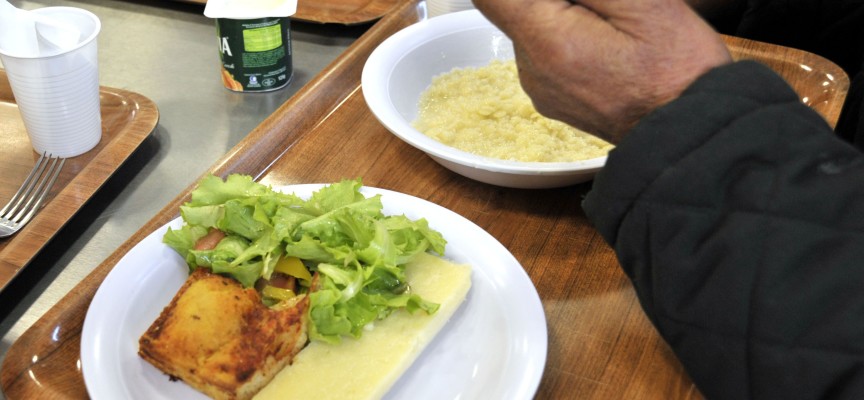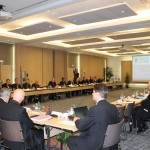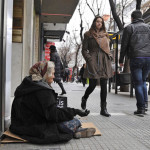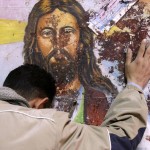By continuing a process which had been set out along with several European Catholic organizations (Caritas Europe, COMECE, Commission Justice and Peace Europe, FEAMC, ICMC, ICCPPC, FEBA, and UNIAPAC), the CCEE Commission Caritas in Veritate in collaboration with the Catholic Bishops’ Conference of Bosnia-Herzegovina promoted a meeting for the protagonists of the Works of Mercy in Europe (Sarajevo, 15-18 September 2016). It was also the occasion for reflecting on the urgency and the topical character of Mercy in Europe today and the different forms of commitment of the Church.
Several moments of reflection and testimony have shown that the human person is at the heart of the action of the Church. It is not an anonymous individual, but the person, within the limits of his or her creatural being – always in need of relations (and not only human ones) and of experiencing the love of God – the object of the attention of the Church when she feeds people through the Food Bank, when she visits the prisons, when she receives the migrants or refugees, when she visits the sick and takes care of them, when she buries the dead, when she defends fair jobs, or she brings to the world of politics the rich heritage of her social doctrine. The numerous activities put in place by these Church bodies highlight a sense of gratitude and strong hope for the creative boldness and innovative capacity in tackling the various forms of poverty. Through the Works of Mercy, the Catholic Church in Europe is aware that she is educating to the meaning of human suffering, which recognizes and appreciates the value of each individual life and opposes the culture of discard. At the same time, participants have identified certain phenomena that challenge the Church and the whole society in Europe.
In a time of great challenges, it is ever more urgent to restore hope to Europe. This is possible through a presence that lives an evangelized Christian love that is not reduced to mere sentimentality. At the same time, participants repeatedly noted that the privatization of faith in secularized countries has often led to a rift between spiritual and corporal works of mercy, because the latter, perceived as a public expression of one’s faith, are not always well received by secular institutions. Not unfrequently, in fact, the legal and administrative apparatus put in place by governments in Europe, while appreciating the immense service that the various Church organizations make to society, seems to reduce Christian commitment to mere philanthropy, thus depriving it of its religious reference. Multiplication, diversity, and the weight of such a legal and administrative apparatus make it difficult to manage solidarity today. In time, all these elements have led to a separation between the “act” born of faith and the Christian proclamation: sometimes you get the impression that you can do good only at the cost of sacrificing the proclamation of Jesus’ Word. If the Church clearly condemns any charitable activity which is subject to and motivated by mere proselytism, on the other hand she insists that the Christian faithful cannot separate the works from their own faith, as the very person of Jesus Christ is their very source and support.
In his message to participants, Pope Francis recalled the need to “contribute to the rebirth of Europe” and dream of “a new European humanism” while encouraging the “representatives of the bishops in Europe, to involve more and more your communities and the different social actors who carry out activities in the field of charity and social aid in the commitment to proclaim the Gospel to those who have lost – due to various causes – the direction of their lives.” Only in this way the Church can “be a process-generating mother, a fertile mother, because she respects life and offers real hope”.
In Sarajevo, the leaders of Church organizations have also recalled how, in the face of various forms of material and spiritual ‘poverty’, it is necessary not only to respond to the urgency dictated by suffering, by providing a service or a presence that can alleviate the pain of the moment, but rather to work together with the person in trouble, engaging the whole community, and communicating around these forms of poverty. The numerous testimonials shared in these days have shown how the works of mercy are interconnected. Their wish is therefore that the different ecclesial bodies can continue to support each other and develop new forms of collaboration. In fact, it is absolutely necessary that, wherever an ecclesial body is involved, the entire Christian community feels challenged. A proper communication must then promote an awareness that impacts the whole humankind. In fact, in the face of human suffering there is no religious or political barrier: “everyone should feel co-responsible for the well-being of the others,” said the participants.
Finally, in Sarajevo, emblematic city because of the intense suffering endured and the still open wounds caused by a conflict that lasted years and by agreements which are favouring a policy based on inertia and discrimination on ethnic grounds, the mercy of the Church is made visible by numerous works, such as the School for Europe – one of the six works of mercy visited by the participants – which had been opened during the conflict, to testify that the war was not necessary, nor the ethnic separation inevitable, but that peaceful coexistence was and is still always possible. Joining the Holy Father, it was prayed for peace, a clear sign of divine Mercy, especially in Ukraine and in the countries of the Middle East.
Proseguendo un cammino avviato insieme a diversi organismi cattolici europei (Caritas Europa, Comece, Commissione Giustizia e Pace Europa, FEAMC, ICMC, ICCPPC, FEBA, UNIAPAC), la Commissione CCEE Caritas in Veritate, in collaborazione con la Conferenza episcopale della Bosnia-Erzegovina, ha promosso un incontro tra quanti in Europa sono protagonisti delle opere di Misericordia (Sarajevo, 15-18 settembre 2016). È stata anche l’occasione per una riflessione sull’urgenza, l’attualità della Misericordia oggi in Europa e le diverse forme d’impegno della Chiesa.
I lavori hanno visto diversi momenti di riflessione e di testimonianza che hanno mostrato come al centro dell’azione della Chiesa stia la persona umana. Non è a un anonimo individuo, ma alla persona, nel limite del suo essere creatura sempre bisognosa di relazioni non solo umane e di sperimentare l’amore di Dio, verso cui si china la Chiesa quando dà da mangiare attraverso il Banco alimentare, quando visita i carceri, quando accoglie il migrante o il rifugiato, quando cura e visita l’ammalato, quando seppellisce i defunti, quando difende il lavoro dignitoso o porta nel mondo della politica il ricco patrimonio della dottrina sociale della Chiesa. Dalle numerose attività messe in campo da questi organismi ecclesiali emerge un senso di gratitudine e di viva speranza per l’audacia creativa e la capacità innovativa con cui affrontano le varie forme di povertà. Attraverso le opere di Misericordia, la Chiesa cattolica in Europa sa di educare al senso della sofferenza umana, che riconosce e apprezza il valore di ogni singola vita ed evita lo scarto delle persone. Allo stesso tempo, i partecipanti hanno rilevato alcuni fenomeni che interpellano la Chiesa e l’intera società in Europa.
In un tempo di grandi sfide, appare quanto mai urgente ridare speranza all’Europa. Questo è possibile attraverso una presenza che viva un amore cristiano evangelizzato che non si riduce a pure sentimentalismo. Allo stesso tempo, i partecipanti hanno più volte rilevato come la privatizzazione della fede nei Paesi secolarizzati abbia spesso portato a una spaccatura tra le opere di misericordia spirituali e quelle materiali, in quanto le opere “materiali”, percepite come espressione pubblica della propria fede, non vengono sempre ben accolte dalle istituzioni secolari. Non di rado, infatti, l’apparato giuridico e amministrativo messo in campo dai governi in Europa, pur apprezzando l’immenso servizio che le varie organizzazioni ecclesiali rendono all’intera società, sembrano voler ridurre l’impegno cristiano a mera filantropia, privandolo dal suo riferimento religioso. La moltiplicazione, la diversità e il peso dell’apparato giuridico e amministrativo rendono oggi difficile gestire la solidarietà. Con il tempo, tutti questi elementi hanno portato a una separazione tra “l’atto”, che nasce dalla fede, e l’annuncio cristiano: a volte sembra che sia possibile fare del bene solo al costo di rinunciare all’annuncio della parola di Gesù. Se la Chiesa, condanna chiaramente un’attività caritatevole subordinata e motivata dal mero proselitismo, ricorda tuttavia che, per il cristiano, non è possibile separare le opere dalla propria fede, in quanto è proprio la persona di Cristo ad esserne fonte e sostegno.
Nel suo messaggio ai partecipanti, Papa Francesco ha ricordato il bisogno di “contribuire alla rinascita dell’Europa” e a sognare “un nuovo umanesimo europeo” incoraggiando i “rappresentanti dell’episcopato europeo a coinvolgere sempre più le comunità e le diverse realtà caritative e assistenziali nell’impegno ad annunciare il Vangelo a quanti hanno smarrito per varie cause l’orientamento della loro vita.” Solo così la Chiesa può “essere una madre generatrice di processi, quindi feconda, perché rispetta la vita e offre speranze di vita”.
A Sarajevo, i responsabili degli organismi ecclesiali hanno anche ricordato come, di fronte alle varie forme di ‘povertà’, materiali e spirituali, sia necessario non solo rispondere all’urgenza dettata dalla sofferenza, fornendo un servizio o una presenza che possa alleviare il dolore del momento, ma piuttosto lavorare insieme alla persona in difficoltà, impegnando l’intera comunità e comunicando attorno a queste povertà. Le molte testimonianze portate in questi giorni hanno fatto vedere come le opere di misericordia siano interconnesse. È pertanto auspicabile che i diversi organismi ecclesiali possano continuare a sostenersi a vicenda e sviluppare nuove forme di collaborazione. Infatti è assolutamente necessario che, laddove interviene un organismo ecclesiale, sia l’intera comunità cristiana a sentirsi interpellata. Una giusta comunicazione dovrà poi promuovere una presa di coscienza che tocca l’intera umanità. Infatti, di fronte alla sofferenza dell’umanità non esiste nessuna barriera religiosa o politica: “Tutti dobbiamo sentirci corresponsabili del benessere dell’altro”, hanno detto i partecipanti.
Infine, a Sarajevo, città emblematica per le molteplici sofferenze subite e le ferite ancora aperte da un conflitto durato anni e da accordi che stanno favorendo una politica dell’inerzia e discriminatoria su base etnica, la misericordia della Chiesa è manifestata da numerose opere, come quella della Scuola per l’Europa – una delle sei opere di misericordia visitate dai partecipanti – aperta durante il conflitto, per testimoniare che la guerra non era una necessità, né la separazione etnica una fatalità, ma che la convivenza pacifica era ed è sempre possibile.
Unendosi al Santo Padre, si è pregato per la Pace, segno chiaro della misericordia divina, specialmente in Ucraina e nei Paesi del Medio Oriente.
Le devoir chrétien de donner l’espérance
Poursuivant un parcours entrepris avec divers organismes catholiques européens (Caritas Europe, Comece, Commission Justice et Paix Europe, FEAMC, ICMC, ICCPPC, FEBA, UNIAPAC), la Commission CCEE Caritas in Veritate en collaboration avec la Conférence épiscopale de Bosnie-Herzégovine a promu une rencontre de ceux qui en Europe sont les acteurs des œuvres de miséricorde (Sarajevo, 15-18 Septembre 2016). Cela a été l’occasion d’une réflexion sur l’urgence et l’actualité de la miséricorde aujourd’hui en Europe et sur les diverses formes d’engagement de l’Église.
Les travaux ont été constitués de divers moments de réflexion et de témoignage qui ont montré que la personne humaine est placée au centre de l’action de l’Église. Ce n’est pas un individu anonyme mais la personne, dans la limite de son être-créature qui a toujours besoin de relations non seulement humaines mais d’expérimenter l’amour de Dieu, sur qui se penche l’Église quand elle donne à manger par l’intermédiaire de la Banque alimentaire, quand elle visite les prisonniers, quand elle accueille le migrant ou le réfugié, quand elle soigne et rend visite au malade, quand elle enterre les défunts, quand elle défend la dignité du travail ou qu’elle offre au monde politique le riche patrimoine de sa doctrine sociale. Des nombreuses activités mises en œuvre par ces organismes ecclésiaux on voit émerger de la gratitude et une vive espérance pour l’audace créative et la capacité d’innovation avec lesquelles ils font face aux diverses formes de pauvreté. Par les œuvres de miséricorde, l’Église catholique en Europe sait qu’elle éduque au sens de la souffrance humaine, qu’elle reconnaît et apprécie la valeur de la vie de chaque homme et évite le rejet des personnes. En même temps, les participants ont mis en évidence plusieurs phénomènes qui interpellent l’Église et toute la société européenne.
À une époque de grands défis, il apparaît tout à fait urgent de redonner une espérance à l’Europe. Cela est possible s’il y a une présence vivant un amour chrétien évangélisé qui ne se réduit pas à un pur sentimentalisme. En même temps les participants ont souligné plusieurs fois que la privatisation de la foi dans les pays sécularisés a souvent provoqué une cassure entre les œuvres de miséricorde spirituelles et matérielles, dans la mesure où les œuvres « matérielles », perçues comme une expression publique de la foi, ne sont pas toujours bien accueillies par les institutions séculières. Il n’est pas rare, en effet, que l’appareil juridique et administratif mis en œuvre par les gouvernements en Europe, bien qu’appréciant l’immense service que les différentes organisations ecclésiales rendent à l’ensemble de la société, semblent vouloir réduire l’engagement chrétien à une pure philanthropie en le privant de sa référence religieuse. La multiplication, la diversité et le poids de l’appareil juridique et administratif rendent aujourd’hui difficile la gestion de la solidarité. Progressivement, tous ces éléments ont conduit à une séparation entre l’« acte » qui naît de la foi et l’annonce chrétienne : il semble parfois qu’il ne soit possible de faire le bien que si l’on renonce à l’annonce de la parole de Jésus. Si l’Église condamne clairement une activité charitable subordonnée et motivée par le prosélytisme, elle rappelle que pour le chrétien il n’est pas possible de séparer ses œuvres de sa foi, en tant que c’est précisément la personne du Christ qui en est la source et le soutien.
Dans son message aux participants, le pape François a rappelé le besoin de « contribuer à la renaissance de l’Europe » et à rêver « un nouvel humanisme européen » en encourageant les « représentants de l’épiscopat européen à impliquer toujours plus les communautés et les diverses entités caritatives et d’assistance dans l’effort d’annoncer l’Évangile à ceux qui ont égaré pour diverses raisons l’orientation de leur vie ». C’est la seule manière pour l’Église d’« être une mère génératrice de projets, et donc féconde, parce qu’elle respecte la vie et offre des espérances de vie ».
À Sarajevo, les responsables des organismes ecclésiaux ont également rappelé que, face aux diverses formes de « pauvreté », matérielles et spirituelles, il est nécessaire non seulement de répondre à l’urgence dictée par la souffrance, en fournissant un service ou une présence qui puisse soulager la douleur du moment, mais aussi et surtout travailler avec la personne en difficulté, en engageant toute la communauté et en communiquant sur tout ce qui concerne ces pauvretés. Les nombreux témoignages apportés lors de ces journées ont montré que les œuvres de miséricorde sont interconnectées. Il est donc souhaitable que les divers organismes ecclésiaux puissent continuer à se soutenir les uns les autres et à développer de nouvelles formes de collaboration. En effet, il est absolument nécessaire que, là où intervient un organisme ecclésial, ce soit la communauté entière à se sentir interpellée. Une juste communication devra ensuite promouvoir une prise de conscience qui touche toute l’humanité. En effet, face à la souffrance de l’humanité, il n’existe aucune barrière religieuse ou politique : « Nous devons tous nous sentir coresponsables du bien de l’autre », ont dit les participants.
Enfin, à Sarajevo, ville emblématique de notre temps pour les multiples souffrances qu’elle a endurées et les blessures encore ouvertes par un conflit qui a duré plusieurs années et par des accords – de Dayton – qui favorisent une politique de l’inertie, discriminatoire sur une base ethnique, la miséricorde de l’Église est manifestée par de nombreuses œuvres, telles que celle de l’École pour l’Europe – une des six œuvres de miséricorde visitées par les participants – ouverte durant le conflit, pour témoigner que la guerre n’était pas une nécessité, ni la séparation ethnique une fatalité, mais que la cohabitation pacifique était et est toujours possible.
S’unissant au Saint-Père, les participants ont prié pour la paix, signe clair de la miséricorde divine, spécialement en Ukraine et dans les pays du Moyen Orient.
Die christliche Pflicht, Hoffnung zu geben
In Verfolgung eines gemeinsam mit verschiedenen katholischen Organisationen in Europa (Caritas Europa, Comece, Kommission Justitia et Pax, FEAMC, ICMC, ICCPPC, FEBA, UNIAPAC) beschrittenen Weges organisierte die CCEE-Kommission Caritas in Veritate im Zusammenarbeit mit der Bischofskonferenz Bosnien-Herzegowina eine Begegnung derer, die heute in Europa Protagonisten der barmherzigen Werke sind (Sarajevo, 15.-18. September 2016). Es war auch eine Gelegenheit zur Reflexion über die Dringlichkeit und Aktualität der Barmherzigkeit heute in Europa und über die verschiedenen Formen des Einsatzes der Kirche.
Im Laufe der Arbeiten gab es diverse Momente der Reflexion und der Berichterstattung, die zeigten, dass der Mensch stets im Mittelpunkt des kirchlichen Handelns steht. Nicht zum anonymen Individuum, sondern zum Menschen als Geschöpf, das immer nicht nur zwischenmenschlicher Beziehungen, sondern auch der Liebe Gottes bedarf, beugt sich die Kirche herab, wenn sie mithilfe von Lebensmittelbanken die Hungrigen speist, wenn sie die Gefängnisse besucht, den Flüchtling oder den Migranten aufnimmt, Kranke heilt und besucht, die Toten bestattet, wenn sie sich für Arbeit in Würde einsetzt oder das reiche Erbe der kirchlichen Soziallehre in die Welt der Politik trägt. Aus den zahlreichen Tätigkeiten, denen die kirchlichen Einrichtungen nachgehen, sprechen Dankbarkeit und lebendige Hoffnung sowie die Kühnheit, die Kreativität und der innovative Geist, mit denen sie sich den verschiedenen Formen der Armut stellen. Durch die Werke der Barmherzigkeit erzieht die katholische Kirche in Europa auch zum Bewusstsein für das menschliche Leiden, zu einem Bewusstsein, das den Wert eines jeden Lebens anerkennt und sich der Ausgrenzung der Menschen entgegenstellt. Auch zeigten die Teilnehmer Erscheinungen auf, die die Kirche und die gesamte europäische Gesellschaft zum Handeln aufrufen.
In einer Zeit der großen Herausforderungen ist es wichtiger denn je, Europa neue Hoffnung zu geben. Dies kann durch die christliche, evangelisierte Liebe geschehen, die sich nicht auf reine Sentimentalität reduziert. Gleichzeitig stellen die Teilnehmer mehrfach klar, dass die Privatisierung des Glaubens in den säkularisierten Ländern oftmals zu einer Spaltung zwischen den geistigen und den körperlichen Werken der Barmherzigkeit führt, dahingehend, dass die „materiellen“ Werke, die als öffentlicher Ausdruck des eigenen Glaubens gesehen werden, von den weltlichen Institutionen nicht immer gerne angenommen werden. In der Tat scheint es oftmals, als wolle der von den europäischen Regierungen eingesetzte Rechts- und Verwaltungsapparat, der zwar den außerordentlichen Dienst schätzt, den die verschiedenen kirchlichen Organisationen der Gesellschaft insgesamt leisten, den christlichen Einsatz auf eine rein philanthropisch motivierte Leistung reduzieren und ihn so seines religiösen Hintergrundes berauben. Die Unterschiedlichkeit und das Gewicht eines ausufernden Rechts- und Verwaltungsapparats machen heute Solidarität zu einem Hürdenlauf. Mit der Zeit haben all diese Elemente zu einer Trennung zwischen dem „Akt“ selbst, der aus dem Glauben heraus entsteht, und der christlichen Verkündigung geführt; manchmal scheint es, als könne Gutes nur unter Verzicht auf die Verkündung von Christi Wort gewirkt werden. Daher erinnert die Kirche, die natürlich jegliche karitative Tätigkeit um der reinen Proselytenmacherei willen klar und eindeutig verurteilt, doch daran, dass es für einen Christen unmöglich ist, barmherzige Werke von seinem Glauben zu trennen, denn Christus ist ihre Quelle und ihre Stütze.
In seiner Botschaft an die Teilnehmer erinnert Papst Franziskus an die Notwendigkeit, „zur Wiedergeburt Europas beizutragen“, von einem „neuen europäischen Humanismus“ zu träumen und die „Vertreter des europäischen Episkopats zu ermutigen, ihre Gemeinden und die verschiedenen karitativen und sozialen Einrichtungen in immer stärkerem Maße in die Aufgabe einzubinden, die darin besteht, das Evangelium denen zu verkünden, die aus unterschiedlichen Gründen die Orientierung in ihrem Leben verloren haben“. Nur so kann die Kirche „eine fruchtbare Mutter sein, die Prozesse in Gang setzt, weil sie das Leben achtet und Hoffnungen für dieses Leben bietet“.
Die Verantwortlichen der kirchlichen Organisationen haben in Sarajevo auch daran erinnert, dass es angesichts der verschiedenen Formen spiritueller und materieller ‘Armut’ nicht nur darum geht, den unmittelbaren Leidensdruck durch den entsprechenden Dienst oder persönliche Anwesenheit zu lindern, sondern dass man vielmehr mit dem Menschen, der sich in Schwierigkeiten befindet, zusammenarbeiten und dabei die gesamte Gemeinschaft in die Kommunikation um diese Armut herum einbinden muss. Es ist daher wünschenswert, dass die diversen kirchlichen Organisationen sich weiterhin gegenseitig unterstützen und auch neue Formen der Zusammenarbeit entwickeln. Tatsächlich ist es unbedingt notwendig, dass sich die ganze Christengemeinde angesprochen fühlt, wenn eine Kircheneinrichtung aktiv wird. Eine angemessene Kommunikation sollte außerdem auf die Bewusstmachung des Leids der ganzen Menschheit abzielen, vor dem es keine religiöse oder politische Barriere geben darf: „Wir müssen uns alle für das Wohlergehen unseres Nächsten mitverantwortlich fühlen“ sagten die Teilnehmer.
Und gerade in Sarajevo, dieser Stadt, die so viel Leid erdulden musste und wo die Wunden, die ein jahrelanger Krieg geschlagen hat, noch immer nicht verheilt sind, wo nicht zuletzt Abkommen wie das von Dayton eine Politik des Nichtstuns und der ethnischen Diskriminierung befördern – in einer Stadt also, die emblematisch für unsere Zeit ist, manifestiert sich die Barmherzigkeit der Kirche in zahlreichen Werken. Ein Beispiel ist die Schule für Europa (eines der sechs von den Teilnehmern besuchten Werke), die während des Krieges geöffnet blieb, um zu bezeugen, dass Krieg keine Notwendigkeit und die ethnische Spaltung nicht vom Schicksal bestimmt ist, sondern dass ein friedliches Zusammenleben möglich war und immer noch ist.
Zusammen mit dem Papst, wurde es gebeten für den Frieden, jenes deutliche Zeichen der göttlichen Barmherzigkeit, besonders in der Ukraine und in den Ländern des Nahen Ostens.
Latest posts by EURCOM (see all)
- What are the aims of the European security and defence policy? - 12 aprile 2017
- The Church is for the European project - 28 marzo 2017
- A message for Europe - 28 marzo 2017











